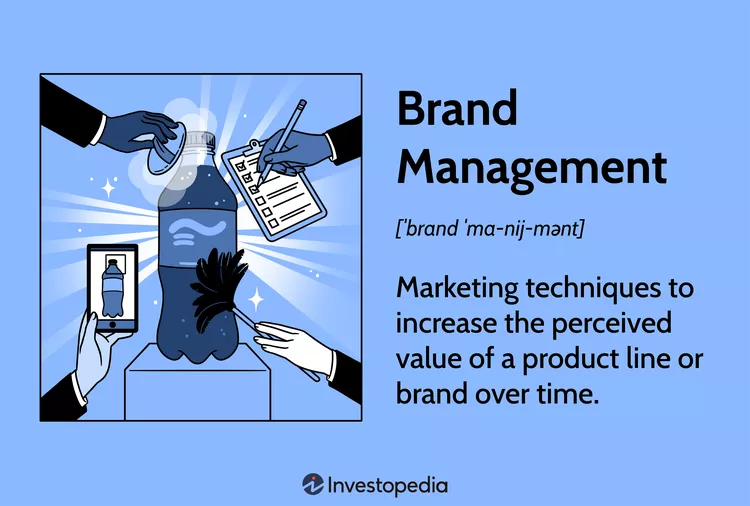What Is Brand Management?
Brand management is a function of marketing that uses techniques to increase the perceived value of a product line or brand over time. Effective brand management enables the price of products to go up and builds loyal customers through positive brand associations and images or a strong awareness of the brand.
Developing a strategic plan to maintain brand equity or gain brand value requires a comprehensive understanding of the brand, its target market, and the company’s overall vision.
Key Takeaways
- Brand management is a function of marketing that uses techniques to increase the perceived value of a product line or brand over time.
- Effective brand management helps a company build a loyal customer base and helps fuel a company’s profits.
- A brand manager ensures the innovation of a product or brand, creating brand awareness via the use of price, packaging, logo, associated colors, and lettering format.
- Brand management is usually centered around fostering the brand recognition, brand equity, and brand loyalty of a product.
- Brand equity refers to the value a company gains from its name recognition, enabling it to be the popular choice among consumers even when compared to a generic brand with a lower price point.
How Brand Management Works
Brands have a powerful influence on customer engagement, competition in the markets, and the management of a company. A strong master brand presence in the market differentiates a company’s products from its competitors and creates brand affinity for a company’s products or services.
A brand that has been established has to continually maintain its brand image through brand management. Effective brand management increases brand awareness, measures and manages brand equity, drives initiatives that support a consistent brand message, identifies and accommodates new brand products, and effectively positions the brand in the market.
It takes years to establish a brand, but when it finally occurs, it has to still be maintained through innovation and creativity. Notable brands that have established themselves as leaders in their respective industries over the years include Coca-Cola, McDonald’s, Microsoft, IBM, Procter & Gamble, CNN, Disney, Nike, Ford, Lego, and Starbucks.
Benefits of Brand Management
- Distinguished Products. According to the most recent U.S. Census data, there were over 265,000 full-service restaurants in the United States as of 2022.1 Strong brand management is necessary if any of these restaurants want to be recognizable apart from their competitors.
- Strong Employee Engagement. Brand management begins with the internal buy-in of the values, principles, and perception of a product. By ensuring all people in a company are part of the brand management process, employees may be more likely to buy into the strategic plan of the brand and company.
- Increased sales quantity. Though never a given, stronger brand management that drives brand loyalty and brand equity may drive stronger sales quantities. As more consumers are tied to a brand or positively recognize a brand, they are more likely to choose it over an unfamiliar alternative (all else being equal).
- Increased CLV. Customer lifetime value. In addition to greater sales quantities, brand management drives stronger value over the lifespan of a customer. Customers are more likely to repeat purchases if they have a positive experience and may be more likely to buy different products along the same product line if they forge strong brand loyalty with a single brand.
- Leveraged Pricing. If a company has a strong reputation with the market, their brand management may be leveraged to other products. This means a company can sell products at a premium if their brand invokes a strong enough connection to consumers (e.g., Apple).
- Less Volatile Market Position. Though companies always risk depressed financial results during market downturns, companies with stronger brand management may be able to weather the storm easier. This is because consumers may find it non-negotiable to deviate from companies they have strong, positive associations with even during inclement financial times.
Effective Brand Management Techniques…
Read the full article at Investopedia


